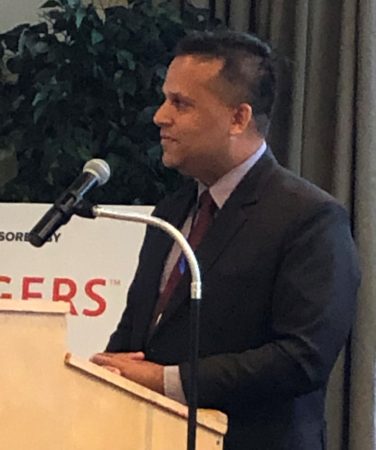Millennials warming up to non-trucker jobs, says report
 BRAMPTON, Ont. – While a longhaul driving career may not be on their radar, a large number of millennials could still be open to other jobs in the trucking industry, a Trucking HR Canada survey has revealed.
BRAMPTON, Ont. – While a longhaul driving career may not be on their radar, a large number of millennials could still be open to other jobs in the trucking industry, a Trucking HR Canada survey has revealed.
The survey of 2,000 millennials, who are defined as those born between 1980 and 2000, was conducted in December 2018.

“These individuals haven’t necessarily thought about trucking as a career, but they actually have the same right aptitude, right interest. They are looking for a blue-collar type of career, and trucking could fit within that,” said Craig Faucette, director of policy and programs at Trucking HR Canada.
Faucette was addressing the 21st annual Link Conference in Brampton, Ont., on Wednesday. It was organized by TransCore Link Logistics.
The driver shortage is one of the most pressing issues the industry is facing, with the latest estimate forecasting a shortage of up to 50,000 drivers by 2024.
The study provides an insight into what motivates millennials and how employers can adapt to better attract younger workers into the industry, Faucette said.
“Millennials look at things a lot differently than we all do. For example, image and brand are important to them… They want to know ‘how this can be instagrammable,’” he said.
The study found three types of millennials – non-trucker prospects, trucker prospects, and warm trucker leads.
Non-trucker prospects make up 48% of the millennial population.
“They will not realistically be persuaded to consider a trucking career,” the survey concludes, but they could still become an important source of labor for the industry’s non-driving positions.
Trucker prospects make up 42%, a group which has no interest in longhaul trucking.
“But their career interests align with trucker-type work, indicating some potential of being persuaded to consider longhaul trucking with the right communications campaign,” the study said.
Twelve percent of millennials, or 1 million people, belong to the third category — warm trucker leads. The study noted that they are interested in a career in longhaul trucking, and that their interest must be further cultivated and maximized.
Faucette said there are many things the industry could do to attract more young people.
It should modernize recruitment practices, review compensation structures and strategies, consider mutually beneficial and flexible work opportunities, and refresh the corporate culture. He also said there is also a perception among millennials that the industry is not a safe place to work.

Addressing the same conference, Manan Gupta of Newcom South Asian Media noted that the industry has yet to fully embrace diversity despite hiring a large number of immigrants.
He cited Newcom research, which showed that Indians accounted for 43.7% of immigrant truck drivers in 2016, up sharply from 8.7% in 1991.
“They really need to create a work culture in celebrating diversity,” Manan said of the industry.
Have your say
This is a moderated forum. Comments will no longer be published unless they are accompanied by a first and last name and a verifiable email address. (Today's Trucking will not publish or share the email address.) Profane language and content deemed to be libelous, racist, or threatening in nature will not be published under any circumstances.
Shortage bull it has to do with wages both of my sons are in the millwright trade starting at more than any truck driver gets to start and both will end up at double what trucking pays without any of the hoops a trucker has to jump through and that was not always the case when I started 30 years ago trucking was a well paying job
What kind of job is this?
-
I’m in OTR driver. I’m in my mid-60s. I am a white Anglo-Saxon. The biggest mistake I made in my life was not becoming a long-haul driver in my thirties. I absolutely love the open road. It’s more than a career… it is a lifestyle!
Through my observation over many years of on the road…. I totally understand why this is not a favorable career for most individuals, particularly millennials.
With the cost of over $10,000 to get a Class 1 license, and virtually not be trained at all, and then have to find a job in the open market, where no one will hire you because you do not have experience, and if you do finally get a job it is at a minimal income only offset, if it’s offset at all, by the amount of hours a person puts behind the wheel!
The amount of piss poor companies out there that look at a driver as a commodity…. is extraordinary. Good companies are far and few between and those companies are having a very challenging time.
Currently and in the immediate future, rates have declined to 2017 levels and many companies have had a 45% increase in insurance rates. Who is going to suffer? Trust me it will be The Driver…. But it’s certainly not the driver’s fault…. It’s an industry fault, including the government’s fault for allowing such horrible companies to hire these piss-poor drivers.
I do the hiring for the company I work with as I can no longer Drive in the roads, courtesy of health issues that were exacerbated due to the advent of ELD’s.
As for hiring… It is getting increasingly difficult to find a driver I am comfortable with to drive one of our trucks.
I recently ran an ad in Kijiji and I had 65 responses… of which only five were marginally qualified to drive our equipment! And the sad part is we just pull 53-foot dry vans…. sad because are not talking about difficult Freight or heavy heavy loads.
If our industry actually paid a reasonable amount of money for the time away, it would be a wonderful lifestyle choice. Have I enjoyed my time on the road…. absolutely!
Why do you think there’s such a rush to autonomous vehicles? Once again to cut costs…. And to offset the pending driver shortage…. Which is very real. But before we get there two autonomous vehicles there will be a continuous need for good operators come up which are far and few between.
I’m what you’d consider a millennial, I guess. I am an OTR truck driver. Most of us born between 1980 and 1989 are not looking for what is “instagrammable”. We are looking for what is stable and what will provide us a long term income to take care of our families and buy things that we want. The 1980s children aren’t into tech as much as you might think, but this article has some interesting facts and if we really are experiencing a massive driver shortage by 2024, maybe we should look at individuals on our welfare system a little closer, eh? Many of them (not all)are able bodied, but just lazy.
-
I would say “unaware” not lazy. I have spoken to many of people that want to do trucking but can’t afford it. I had to educate them on the government subsidies that are available to them. I agree with the article. Cultivation is key.
-
Born 1993 and also an OTR driver. Im with you I need nothing Instagrammable rather a steady work load and decent pay for the long term.
You bring them in, and within 6 months they will hire someone else to drive the vehicle.
A driver shortage is something you all who do NOT drive always spew onto paper. Go drive over the road and see how much time you spend at a truck stop waiting for a run. Besides that, autonomous trucks are coming. Not next week. Maybe not next year but they will replace human drivers. And why not just say it’s so profits can be expanded tremendously and management bonuses can soar. Rather than this pig Latin rhetoric that it’s because the grocery shelves are going to be empty and we’re all going to starve to death if we don’t get autonomous trucks on the road.
I come from a long line of truckers. OTR and local. I myself am trying to put myself through school to get my cdl but with having a family to provide for and bills it’s hard financially to put yourself through schooling. Some places offer training but want you to be gone for 3-4 weeks at a time.
What driver shortage?? 2,500 truckers laid off so far in 2019.
My sentiments exactly. Otr trucking. 1983
Who are you kidding?
I am sick and tired of these articles where they make so much fuss about driver shortage.
Whose interest these articles serve??
Not driver’s for sure.
This industry needs ‘lots of fresh meat’so it can continue functioning as is.Shippers and load brokers need lots of drivers too so they can cut rates even more and keep you on their docks for all day if needed .
I hope there is more driver shortage and then will see better payed drivers,drivers that are paid for all their time and work done,more respect at shippers ,lower turnover rate of drivers, better runs and equipment and more home time.
When you see all that happening, you’ll know there is a drivers shortage.
Regulated the trucking industry and driver’s will be attracted.
It’s hard to give these articles or their presenters any credit when their numbers are all over the place. This one claims there will be a shortage of 50,000 drivers by 2024.
Just a month ago there was an article here saying there would be a shortage of 34,000 drivers by 2024. (June 19 2019 “Driver Shortage Dominates Ministers North Bay Talks”)
And three months ago there was another claiming the industry would be short 33,000 drivers by 2020.
(April 17 2019 “Politicians Address Investment, MELT and Carbon Tax During STA Event”).
These write ups remind me of that saying “if you’re going to be dishonest, you’ve got to have a good memory”.
Random traffic (non-commercial) driving offences on any given record eliminates too many people with impeccable driving skills due to recruitment guidelines.
For example: putting a non experienced new Indian driver without violations behind the wheel “looks good” from the driver abstract safety perspective the company wants to project until the inexperienced driver is involved in some fender bender incidences. A These types of policies eliminate good safe drivers who may have 20 years experience with out any accidents but do have several random “non commercial” violations on there abstract.